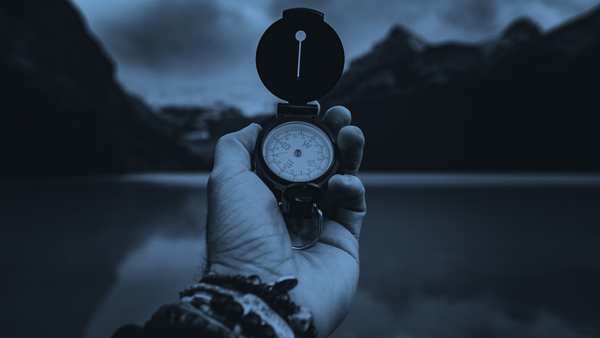A fresh start? Maybe.

WorkLifePsych News 017
Hello and welcome to the first newsletter of 2025.
I hope the year has been kind to you so far, and the return to work hasn't been too rough. I'm a much bigger fan of marking the New Year than I am of Christmas in general. While the run up to the latter can be exhausting and the actual day itself a bit of an anti-climax, January 1st really feels like a fresh start.
Strictly speaking, we don't need to wait for New Year's Day in order to make a fresh start. We can make a fresh start on any day we choose throughout the year, though as humans, we're drawn to anniversaries, the start of a season or even the start of a new year.
🎧 (Check out Ep 096 of My Pocket Psych, where we discussed the psychology of fresh starts and their power when we want to make changes in life.)
Anyone who knows me knows that I'm deeply cynical about New Year's resolutions and everything that they demand of us. The sheer volume of advertising, telling us that we need to make fundamental changes to who we are, and how we look, can feel quite overwhelming.
But at the same time, there's something innately attractive about a fresh start at the beginning of a new year and the potential it holds.
Time for a change?

Regardless of what I think about New Year's resolutions, it's still a time of year when many of us want to embark on some form of change in our lives. You may well be considering it yourself. It might be commencing a new hobby or pastime, engaging in a health-promoting routine or exercise, developing a new skill or setting aside an old and unhelpful habit. And while it can seem like virtually everyone is re-inventing themselves in January, is the popularity of the timing enough for us to join in?
Timing is (nearly) everything
Here in the northern hemisphere at least, it is cold and wet and dark in January. It's not exactly conducive to the kind of enthusiasm and optimism that change can require of us. Many people are also feeling the financial pinch after Christmas-related expenditure. And it can seem like a long time before the next holiday or celebration. All in all, it can feel a little bit miserable.
So is January really the best time to make these kinds of changes? It might be, for you.
Alternatively, there may be something to be said proposing until life has settled down post Christmas and the days are slightly longer. Or indeed, until you've had a good think about the kinds of change you'd like to make and why. This is your journey and there's no need to be in lock-step with everyone else starting on January 1st.
Some principles to bear in mind
Regardless of when you start, and whether it's personal or professional in focus, the change(s) you make will be much more likely to succeed if you bear the following principles in mind:
- Work out your 'why' for the change and ensure it's something you authentically want in your life. This helps you avoid jumping on yet another bandwagon or simply succumbing to social pressure from those around you.
- Distinguish between any goal you want to achieve and the action required to meet it. Get nicely specific about both, so you know what's required and when you'll get there. Goal-setting is easy - goal attainment, requires a lot more effort! We discussed the 'dark side' of goals and goal-setting in 🎧 Ep 152 of My Pocket Psych.
- Whether it's a stretch goal or the cultivation of a new daily habit, make things as easy for yourself as possible. Set up your physical environment to be conducive to the new behaviour(s), and use visual reminders to keep your aims front of mind on a daily basis. Don't rely on 🎧 your prospective memory!
- Start small. So small you can't fail. You can always do more and better later, once your new habits are established.
- Visualise your behaviour with a habit tracker. Personally, I like Streaks, an app that makes habit tracking simple and visually appealing. But you can simply use pen and paper. A visual representation of your unbroken streak of behaviour is motivationally powerful and more reliable than your memory - especially when simple habits are concerned. This also allows you to focus on consistency rather than results - which can often take time to become obvious.
- Avoid an 'all or nothing' perspective if you slip up. Maybe life gets in the way. Maybe you catch a cold and can't make it to the gym. Perhaps an overwhelming workload makes your time feel too precious for hobbies. Whatever the cause, use this as an opportunity to reappraise the situation and look for learning opportunities - rather than abandoning your attempts at change altogether. Adjust your approach, rather than binning it completely.
Whatever you decided to do (or not!) I wish you every success. My over-arching theme for this year is to be 'Fit and Focused', meaning a return to deliberate exercise and leaning in to my life's priorities with more intention. My goals and new habits are aligned with this memorable mantra, keeping things nice and simple.
Health & Wellbeing at Work
A date for your diary! I'm delighted to share that I've been asked to speak at this year's 'Health & Wellbeing at Work' conference at Birmingham's NEC in March.
It's the premier event for everyone interested in, and responsible for, health and wellbeing in the workplace.
I'm contributing on two fronts. I'm giving a talk on the positive contribution increasing employees' psychological flexibility can make to their ability to deal with daily problems and hassles. You can find details of the session here.
I'm also a member of a panel discussion entitled "Unpacking the Systemic Drivers of Workplace Health and Wellbeing", where I'll be contributing alongside my colleague and collaborator Dr. Rachael Skews, and Prof. Dame Carol Black. We'll look at how to support both wellbeing and high performance from a joined-up and systemic perspective. You can find details here.
The line-up of the entire event looks incredibly interesting and you can find out more and reserve your tickets by visiting https://healthwellbeingwork.co.uk
Evidence-based wellbeing
The final episode of 'My Pocket Psych' for 2024 featured a conversation with James Carrier, all about the need to adopt a more evidence-based approach to workplace wellbeing.
On the back of our recent workplace wellbeing workshop in Edinburgh, we look at the impact of being evidence-based when considering wellbeing interventions, the importance of good job design and looking after the essentials, and the benefits of asking the difficult, but fruitful, questions. Such as 'what’s the problem you’re trying to solve?'
You can find Ep 176 wherever you get your podcasts. Alternatively, stream it direct from the website or watch the video of our chat below.
New course dates
After the successful launch of my new psychological flexibility course in the closing months of last year, it's time to announce the dates for the second cohort.
'Thriving with Psychological Flexibility' links the skills that raise our flexibility with our personal wellbeing. By enrolling, you'll learn how to think of your wellbeing holistically, how to show up in the present moment, step back from self-limiting beliefs, persist through the discomfort of change and use your values to guide their decisions and day-to-day behaviour.
It's a truly blended learning experience, with a combination of pre-reading and reflection exercises, followed by a series of fortnightly live, interactive online workshops, and a final online Q&A session.
You can find new course dates and all the other details of the course by visiting this page.




